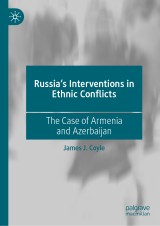Details

Russia's Interventions in Ethnic Conflicts
The Case of Armenia and Azerbaijan|
106,99 € |
|
| Verlag: | Palgrave Macmillan |
| Format: | |
| Veröffentl.: | 30.11.2020 |
| ISBN/EAN: | 9783030595739 |
| Sprache: | englisch |
Dieses eBook enthält ein Wasserzeichen.
Beschreibungen
<p>This book explores the thirty-year border conflict between Armenia and Azerbaijan, specifically around the former autonomous republic of Nagorno Karabakh, and shows how Russia is the only winner in this conflict: fighting on both sides, supplying arms to both sides, and acting as the arbiter between the two sides. The author looks at Armenia, Azerbaijan and the separatists from military, political, economic and diplomatic perspectives, and offers insights on how the fighting has influenced society, and vice versa. The book provides an update to the history of the war to include major fighting in 2020, and examines how Russia obtained three military bases and most economic assets in Armenia, while becoming Azerbaijan's major weapons supplier to the tune of six billion dollars. It shows how Russia has tried to sideline the internationally-supported Minsk negotiations in favor of Russia assuming the sole role of arbiter, and argues that even though Russia has submitted a number of ceasefire proposals, it does little to encourage the sides to implement them.</p>
<p>The book includes a discussion of international law, United Nations Resolutions, and rulings by the European Court of Human Rights.</p>
<p>The book includes a discussion of international law, United Nations Resolutions, and rulings by the European Court of Human Rights.</p>
1.Introduction.- 2.One-Roots of the Conflict.- 3.The Military Face of a Frozen Conflict.- 4.The Politics of Frozen Conflict.- 5.The Economics of Frozen Conflict.- 6.Diplomacy Surrounding Frozen Conflict.- 7.Final Thoughts.
<p><b>James J. Coyle</b> is an international consultant on security and foreign policy. A diplomat for 24 years, he held a variety of positions, including Director of Middle East Studies at the US Army War College. He is the author of <i>Russia's Border Wars and Frozen Conflicts</i> (2018) and a frequent contributor to <i>The Hill</i>. He has taught at several universities in Southern California, and was a nonresident fellow of the Atlantic Council.</p><p></p>
<p>This book explores the thirty-year border conflict between Armenia and Azerbaijan, specifically around the former autonomous republic of Nagorno Karabakh, and shows how Russia is the only winner in this conflict: fighting on both sides, supplying arms to both sides, and acting as the arbiter between the two sides. The author looks at Armenia, Azerbaijan and the separatists from military, political, economic and diplomatic perspectives, and offers insights on how the fighting has influenced society, and vice versa. The book provides an update to the history of the war to include major fighting in 2020, and examines how Russia obtained three military bases and most economic assets in Armenia, while becoming Azerbaijan's major weapons supplier to the tune of six billion dollars. It shows how Russia has tried to sideline the internationally-supported Minsk negotiations in favor of Russia assuming the sole role of arbiter, and argues that even though Russia has submitted a number of ceasefire proposals, it does little to encourage the sides to implement them.</p><p>The book includes a discussion of international law, United Nations Resolutions, and rulings by the European Court of Human Rights.</p><p><b>James J. Coyle</b> is an international consultant on security and foreign policy. A diplomat for 24 years, he held a variety of positions, including Director of Middle East Studies at the US Army War College. He is the author of <i>Russia's Border Wars and Frozen Conflicts</i> (2018) and a frequent contributor to <i>The Hill</i>. He has taught at several universities in Southern California, and was a nonresident fellow of the Atlantic Council.</p><p></p>
<p>Highlights how peace conferences can be used to further military aims rather than to end military conflict</p><p>Offers an up-to-date account of the ongoing conflict over Nagorno Karabakh</p><p>Explores possibilities and limitations of conflict resolution</p>
Diese Produkte könnten Sie auch interessieren:

Inclusión educativa de niños, niñas y adolescentes migrantes venezolanos, en Colombia

von: Douglas Jiménez

15,99 €
















